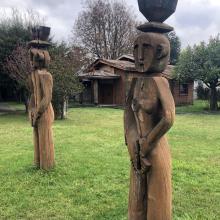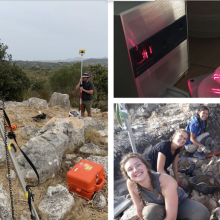From decoding the secrets of pop culture through an anthropological lens, to unraveling the mysteries of human evolution, and exploring the cultural politics behind what we eat — Anthropology's Summer Quarter course offerings will challenge your thinking and spark your curiosity.
These classes are part of University of Washington's Summer Sessions program, which provides more than 1,000 courses in more than 100 different fields of study for current UW students, visitors from other U.S. colleges, high school students, international students, working professionals and other learners.
Summer Key Dates & Deadlines
Priority Registration for UW students opens April 14, 2025, 6 a.m. Registration for Non-UW Students opens April 16, 2025, 6 a.m. Summer instruction begins June 23, 2025. Visit Key Dates & Deadlines for a full breakdown of instruction dates over full-term, A-term and B-term.
Department of Anthropology Summer Courses
Details about each class (including days, times, and credits) are available on the Summer Quarter Time Schedule for Archeology, Anthropology, and Biologicial Anthropology.
ARCHY 205: Principles of Archaeology
This course delves into the exciting world of archaeology, exploring how we unlock the secrets of past societies. We'll examine the fundamental techniques and methods archaeologists employ, from meticulous excavation strategies to sophisticated dating tools. We'll learn about archaeological research, which includes reconstructing past lifeways, understanding cultural development, and piecing together major historical events. No archaeological dig is without its challenges. We'll delve into the general problems encountered in interpreting the archaeological record, including the fragmentary nature of remains, respecting ethical considerations, and the need to reconstruct complex narratives from often-ambiguous clues.
ANTH 209: Anthropology Through Visual Media
Images are everywhere, but what do they mean? Adopting an anthropological approach, this course explores visual media as social artifact and phenomenon. Through ethnographic readings, creative projects, and reflective analysis, you'll cultivate a critical understanding of visual media and examine your own engagement and participation in the visual world.
ANTH 228: Identities: Race, Class, Gender, & Sexuality In Anthropology
Introduction to key concepts of identity including race, ethnicity, gender, sexuality, social class, religion, and nationality. We'll examine how these identities intersect and diverge in the construction and experience of privilege, inequality, discrimination, and oppression. We’ll use ethnographic texts, documentary films, and other media sources to consider questions such as: What is identity? How do we experience our identities? How are identities produced, maintained, and/or transformed? How are our identities represented in popular culture and media?
ANTH 311: The Cultural Politics Of Diet And Nutrition
This course investigates debates in the United States about optimal dietary guidelines for maintaining health and how evolving ideas of individual responsibility and politics shape these discussions. We'll learn how science is used to examine the relationship between diet and chronic diseases in the U.S. We'll explore the rise of a new health-conscious consumer, with an emphasis on how new media technologies, such as web blogs, create communities that critically assess often conflicting health information. We'll also learn how individuals are changing their relationship with food through practices like farm-to-table sourcing and home cooking, and we'll investigate how contemporary food ideologies form communities focused on wellness, sustainability, and social justice.
ANTH 322: Comparative Study Of Death
Death is inevitable but shrouded in mystery and often surrounded by fear, dread, and uncertainty. It is no surprise, though, that reflecting on the meaning of death yields a deeper understanding of the meaning of life. In this course, we will explore understandings and practices of death as a representation of culture and social organization and situate death within a broader understanding of biopolitics and decolonization. We will draw on materials from anthropology and interdisciplinary humanities and social sciences fields, including history and literature.The class will also feature guest speakers including a death doula, spiritual leaders, and community representatives.
ANTH 323: Human Rights Law
This class introduces the complexities of issues surrounding human rights, and examines human rights concerns through critical analyses, taking into account legal, social, economic, and historical variables. Offered jointly with LSJ 321.
ANTH 360: Anthropology of Pop Culture
What do Vampire romances, designer sneakers, and Youtube beauty tutorials have in common? We generally speak of these products as either mindless candy or as techniques of mass control. How might we find other ways to excavate popular culture “in the field”? In this class we’ll bring into anthropological practice a toolkit of conceptual theories from the fields of cultural studies, linguistics, art history, and film to discuss pop culture’s means of production, its impact in the world, its capacity to transform, and its agency as it traverses hands and eyes.
ANTH 375: Comparative Systems of Healing
This course offers a unique opportunity to explore diverse cultural perspectives and healing practices, deepening your understanding of how historical, socio-cultural, and political-economic factors shape healing journeys and experiences across geographies and landscapes. We'll pay particular attention to healers' perspectives, which are evinced through ethnography, autobiographies, and interviews with healers, practitioners, and their patients. By immersing yourself in these varied contexts, you will learn how to think critically and empathetically about the complexities of colonialism and medicine, medical anthropology, and global health.
BIO A 201: Principles Of Biological Anthropology
In this course we'll learn about evolutionary and genetic processes and the roles they have played in shaping the biological and behavioral adaptations of the Primate Order – humans, nonhuman primates, and our ancestors. We will consider what it means to be human and how we “fit” into the larger natural world, examining past, present, and future human variation, the complex interactions of biology, behavior, and our environments.
BIO A 348: Evolutionary Biology And Human Diversity
Introduction to our species’ morphological variation and its evolution. How did humans come to exhibit our fascinating diversity in size, shape, body composition, and pigmentation? In what ways do we vary by geography, by sex, and by age? Moreover, how biologically meaningful is our variation today? In addressing these questions, we will explore methods in anthropometry, the ethical treatment of human subjects in research, and historical perspectives on our biological diversity.
BIO A 484: Applied Human Growth and Development
How is human growth & development unique from other mammals? How do our environments shape growth outcomes? How do we measure and evaluate "healthy growth"? We will examine these questions through applied data analysis and comprehension. Gain proficiency in Excel and basic statistics. Learn to calculate and understand WHO growth reference scores. No stats background necessary!




